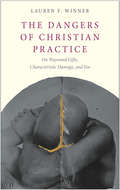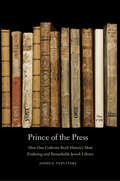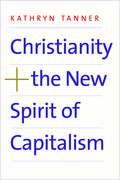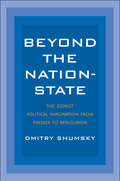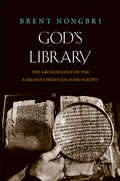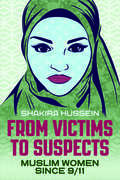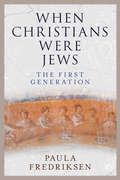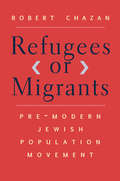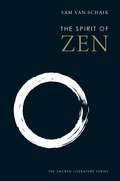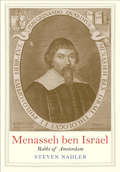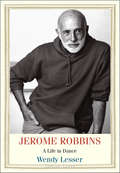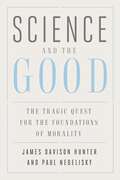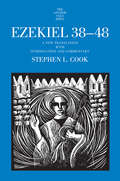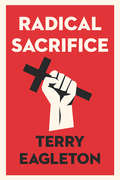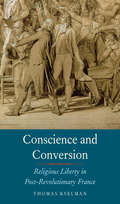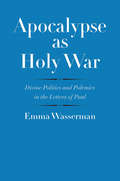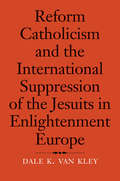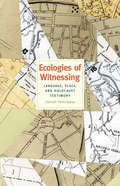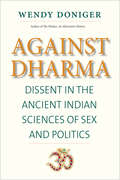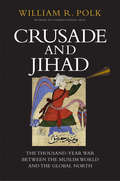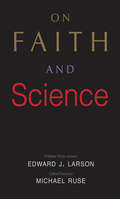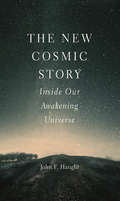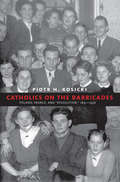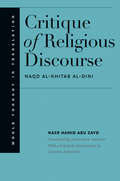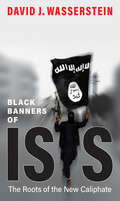- Table View
- List View
The Dangers of Christian Practice: On Wayward Gifts, Characteristic Damage, and Sin
by Lauren F. WinnerChallenging the central place that “practices” have recently held in Christian theology, Lauren Winner explores the damages these practices have inflicted over the centuries Sometimes, beloved and treasured Christian practices go horrifyingly wrong, extending violence rather than promoting its healing. In this bracing book, Lauren Winner provocatively challenges the assumption that the church possesses a set of immaculate practices that will definitionally train Christians in virtue and that can’t be answerable to their histories. Is there, for instance, an account of prayer that has anything useful to say about a slave-owning woman’s praying for her slaves’ obedience? Is there a robustly theological account of the Eucharist that connects the Eucharist’s goods to the sacrament’s central role in medieval Christian murder of Jews? Arguing that practices are deformed in ways that are characteristic of and intrinsic to the practices themselves, Winner proposes that the register in which Christians might best think about the Eucharist, prayer, and baptism is that of “damaged gift.” Christians go on with these practices because, though blighted by sin, they remain gifts from God.
Prince of the Press: How One Collector Built History's Most Enduring and Remarkable Jewish Library
by Joshua TeplitskyThe story of one of the largest collections of Jewish books, and the man who used his collection to cultivate power, prestige, and political influence David Oppenheim (1664–1736), chief rabbi of Prague in the early eighteenth century, built an unparalleled collection of Jewish books and manuscripts, all of which have survived and are housed in the Bodleian Library at Oxford. His remarkable collection testifies to the myriad connections Jews maintained with each other across political borders, and the contacts between Christians and Jews that books facilitated. From contact with the great courts of European nobility to the poor of Jerusalem, his family ties brought him into networks of power, prestige, and opportunity that extended across Europe and the Mediterranean basin. Containing works of law and literature alongside prayer and poetry, his library served rabbinic scholars and communal leaders, introduced old books to new readers, and functioned as a unique source of personal authority that gained him fame throughout Jewish society and beyond. The story of his life and library brings together culture, commerce, and politics, all filtered through this extraordinary collection. Based on the careful reconstruction of an archive that is still visited by scholars today, Joshua Teplitsky’s book offers a window into the social life of Jewish books in early modern Europe.
Christianity and the New Spirit of Capitalism
by Kathryn TannerOne of the world’s most celebrated theologians argues for a Protestant anti-work ethic In his classic The Protestant Ethic and the Spirit of Capitalism, Max Weber famously showed how Christian beliefs and practices could shape persons in line with capitalism. In this significant reimagining of Weber’s work, Kathryn Tanner provocatively reverses this thesis, arguing that Christianity can offer a direct challenge to the largely uncontested growth of capitalism. Exploring the cultural forms typical of the current finance‑dominated system of capitalism, Tanner shows how they can be countered by Christian beliefs and practices with a comparable person‑shaping capacity. Addressing head‑on the issues of economic inequality, structural under- and unemployment, and capitalism’s unstable boom/bust cycles, she draws deeply on the theological resources within Christianity to imagine anew a world of human flourishing. This book promises to be one of the most important theological books in recent years.
Beyond the Nation-State: The Zionist Political Imagination from Pinsker to Ben-Gurion
by Dmitry ShumskyA revisionist account of Zionist history, challenging the inevitability of a one-state solution, from a bold, path-breaking young scholar The Jewish nation-state has often been thought of as Zionism’s end goal. In this bracing history of the idea of the Jewish state in modern Zionism, from its beginnings in the late nineteenth century until the establishment of the state of Israel, Dmitry Shumsky challenges this deeply rooted assumption. In doing so, he complicates the narrative of the Zionist quest for full sovereignty, provocatively showing how and why the leaders of the pre-state Zionist movement imagined, articulated and promoted theories of self-determination in Palestine either as part of a multinational Ottoman state (1882-1917), or in the framework of multinational democracy. In particular, Shumsky focuses on the writings and policies of five key Zionist leaders from the Habsburg and Russian empires in central and eastern Europe in the late nineteenth and early twentieth centuries: Leon Pinsker, Theodor Herzl, Ahad Ha’am, Ze’ev Jabotinsky, and David Ben-Gurion to offer a very pointed critique of Zionist historiography.
God's Library: The Archaeology of the Earliest Christian Manuscripts
by Brent NongbriA provocative book from a highly original scholar, challenging much of what we know about early Christian manuscripts In this bold and groundbreaking book, Brent Nongbri provides an up-to-date introduction to the major collections of early Christian manuscripts and demonstrates that much of what we thought we knew about these books and fragments is mistaken. While biblical scholars have expended much effort in their study of the texts contained within our earliest Christian manuscripts, there has been a surprising lack of interest in thinking about these books as material objects with individual, unique histories. We have too often ignored the ways that the antiquities market obscures our knowledge of the origins of these manuscripts. Through painstaking archival research and detailed studies of our most important collections of early Christian manuscripts, Nongbri vividly shows how the earliest Christian books are more than just carriers of texts or samples of handwriting. They are three-dimensional archaeological artifacts with fascinating stories to tell, if we’re willing to listen.
From Victims to Suspects: Muslim Women Since 9/11
by Shakira HusseinDrawing on interviews and examples from across the globe, this book tackles the shifting narratives surrounding Muslim women Once regarded as passive victims waiting to be rescued, Muslim women are now widely regarded as arbiters of "terror" and a potential threat to be kept under control. Drawing on interviews and examples from around the world including Afghanistan, Pakistan, Europe, and North America, Shakira Hussein shows how this shift in attitude has taken place and how it impacts feminism, multiculturalism, race, and religion on a global scale. She argues that alongside the fear of Islamic terrorism is a growing fear of Islam as a cultural hazard that is undermining Western society from within. Muslim women, the transmitters of cultural practices, are frequently seen to play a key role in this. Hussein’s work makes for a compelling read, offering a unique perspective on what it means to be a Muslim woman post-9/11.
When Christians Were Jews: The First Generation
by Paula FredriksenA compelling account of Christianity’s Jewish beginnings, from one of the world’s leading scholars of ancient religion How did a group of charismatic, apocalyptic Jewish missionaries, working to prepare their world for the impending realization of God's promises to Israel, end up inaugurating a movement that would grow into the gentile church? Committed to Jesus’s prophecy—“The Kingdom of God is at hand!”—they were, in their own eyes, history's last generation. But in history's eyes, they became the first Christians. In this electrifying social and intellectual history, Paula Fredriksen answers this question by reconstructing the life of the earliest Jerusalem community. As her account arcs from this group’s hopeful celebration of Passover with Jesus, through their bitter controversies that fragmented the movement’s midcentury missions, to the city’s fiery end in the Roman destruction of Jerusalem, she brings this vibrant apostolic community to life. Fredriksen offers a vivid portrait both of this temple-centered messianic movement and of the bedrock convictions that animated and sustained it.
Refugees or Migrants: Pre-Modern Jewish Population Movement
by Robert ChazanA leading historian argues that historically Jews were more often voluntary migrants than involuntary refugees For millennia, Jews and non-Jews alike have viewed forced population movement as a core aspect of the Jewish experience. This involuntary Jewish wandering has been explained by pre-modern Jews and Christians as divine punishment, by some modern non-Jews as the result of Jewish harmfulness, by some modern Jews as fostered by Christian anti-Jewish imagery, and by other modern Jews as caused by misguided Jewish acceptance of minority status. In this absorbing book, Robert Chazan explores these various perspectives and argues that pre-modern Jewish population movement was in most cases voluntary, the result of a sense among Jews that there were alternatives available for making a better life elsewhere.
The Spirit of Zen (The Spirit of ...)
by Sam Van SchaikAn engaging introduction to Zen Buddhism, featuring a new English translation of one of the earliest Zen texts Leading Buddhist scholar Sam van Schaik explores the history and essence of Zen, based on a new translation of one of the earliest surviving collections of teachings by Zen masters. These teachings, titled The Masters and Students of the Lanka, were discovered in a sealed cave on the old Silk Road, in modern Gansu, China, in the early twentieth century. All more than a thousand years old, the manuscripts have sometimes been called the Buddhist Dead Sea Scrolls, and their translation has opened a new window onto the history of Buddhism. Both accessible and illuminating, this book explores the continuities between the ways in which Zen was practiced in ancient times, and how it is practiced today in East Asian countries such as Japan, China, Korea, and Vietnam, as well as in the emerging Western Zen tradition.
Menasseh ben Israel: Rabbi of Amsterdam (Jewish Lives)
by Steven NadlerAn illuminating biography of the great Amsterdam rabbi and celebrated popularizer of Judaism in the seventeenth century Menasseh ben Israel (1604–1657) was among the most accomplished and cosmopolitan rabbis of his time, and a pivotal intellectual figure in early modern Jewish history. He was one of the three rabbis of the “Portuguese Nation” in Amsterdam, a community that quickly earned renown worldwide for its mercantile and scholarly vitality. Born in Lisbon, Menasseh and his family were forcibly converted to Catholicism but suspected of insincerity in their new faith. To avoid the horrors of the Inquisition, they fled first to southwestern France, and then to Amsterdam, where they finally settled. Menasseh played an important role during the formative decades of one of the most vital Jewish communities of early modern Europe, and was influential through his extraordinary work as a printer and his efforts on behalf of the readmission of Jews to England. In this lively biography, Steven Nadler provides a fresh perspective on this seminal figure.
Jerome Robbins: A Life in Dance (Jewish Lives)
by Wendy LesserA lively and inspired biography celebrating the centennial of this master choreographer, dancer, and stage director Jerome Robbins (1918–1998) was born Jerome Wilson Rabinowitz and grew up in Weehawken, New Jersey, where his Russian-Jewish immigrant parents owned the Comfort Corset Company. Robbins, who was drawn to dance at a young age, resisted the idea of joining the family business. In 1936 he began working with Gluck Sandor, who ran a dance group and convinced him to change his name to Jerome Robbins. He went on to become a choreographer and director who worked in ballet, on Broadway, and in film. His stage productions include West Side Story, Peter Pan, and Fiddler on the Roof. In this deft biography, Wendy Lesser presents Jerome Robbins’s life through his major dances, providing a sympathetic, detailed portrait of her subject.
Science and the Good: The Tragic Quest for the Foundations of Morality (Foundational Questions in Science)
by James Davison Hunter Paul NedeliskyWhy efforts to create a scientific basis of morality are neither scientific nor moral: &“Important and timely.&”—The Wall Street Journal In this illuminating book, James Davison Hunter and Paul Nedelisky trace the origins and development of the centuries-long, passionate, but ultimately failed quest to discover a scientific foundation for morality. The &“new moral science&” led by such figures as E.O. Wilson, Patricia Churchland, Sam Harris, Jonathan Haidt, and Joshua Greene is only the newest manifestation of that quest. Though claims for its accomplishments are often wildly exaggerated, this new iteration has been no more successful than its predecessors. But rather than giving up in the face of this failure, the new moral science has taken a surprising turn. Whereas earlier efforts sought to demonstrate what is right and wrong, the new moral scientists have concluded, ironically, that right and wrong don&’t actually exist. Their (perhaps unwitting) moral nihilism turns the science of morality into a social engineering project. If there is nothing moral for science to discover, the science of morality becomes, at best, a feeble program to achieve arbitrary societal goals. Concise and rigorously argued, Science and the Good is a definitive critique of a would-be science that has gained extraordinary influence in public discourse today—and an exposé of that project&’s darker turn. &“Science and the Good is a closely argued, always accessible riposte to those who think scientific study can explain, improve or even supersede morality . . . A generous and thoughtful critique.&” —The Daily Telegraph
Ezekiel 38-48: A New Translation with Introduction and Commentary (The Anchor Yale Bible Commentaries)
by Stephen L. CookA fresh interpretation of the final major sections of the Hebrew book of Ezekiel, chapters 38-48 Stephen L. Cook offers an accessible translation and interpretation of the final sections of Ezekiel. These chapters, the most challenging texts of scripture, describe the end-time assault of Gog of Magog on Israel and provide an incredible visionary tour of God’s utopian temple. Following the approach of Moshe Greenberg, the author of the preceding Anchor Yale Bible commentaries on Ezekiel, this volume grounds interpretation of the book in an intimate acquaintance with Ezekiel’s source materials, its particular patterns of composition and rhetoric, and the general learned, priestly workings of the Ezekiel school. The commentary honors Greenberg’s legacy by including insights from traditional Jewish commentators, such as Rashi, Kimhi, and Eliezer of Beaugency. In contrast to preceding commentaries, the book devotes special attention to the Zadokite idea of an indwelling, anthropomorphic “body” of God, and the enlivening effect on people and land of that indwelling.
Radical Sacrifice
by Terry EagletonA trenchant analysis of sacrifice as the foundation of the modern, as well as the ancient, social order The modern conception of sacrifice is at once cast as a victory of self-discipline over desire and condescended to as destructive and archaic abnegation. But even in the Old Testament, the dual natures of sacrifice, embodying both ritual slaughter and moral rectitude, were at odds. In this analysis, Terry Eagleton makes a compelling argument that the idea of sacrifice has long been misunderstood. Pursuing the complex lineage of sacrifice in a lyrical discourse, Eagleton focuses on the Old and New Testaments, offering a virtuosic analysis of the crucifixion, while drawing together a host of philosophers, theologians, and texts—from Hegel, Nietzsche, and Derrida to the Aeneid and The Wings of the Dove. Brilliant meditations on death and eros, Shakespeare and St. Paul, irony and hybridity explore the meaning of sacrifice in modernity, casting off misperceptions of barbarity to reconnect the radical idea to politics and revolution.
Conscience and Conversion: Religious Liberty in Post-Revolutionary France
by Thomas KselmanReligious liberty is usually examined within a larger discussion of church-state relations, but Thomas Kselman looks at several individuals in Restoration France whose high-profile conversions fascinated their contemporaries. Exploring their reasons and the repercussions they faced, Kselman demonstrates how this expanded sense of liberty informs our secular age.
Apocalypse as Holy War: Divine Politics and Polemics in the Letters of Paul (The Anchor Yale Bible Reference Library)
by Emma WassermanPrevailing theories of apocalypticism assert that in a world that rebels against God, a cataclysmic battle between good and evil is needed to reassert God’s dominion. Emma Wasserman, a rising scholar of early Christian history, challenges this interpretation and reframes Paul’s apocalyptic texts as myths about politics in the world of divinity. Wasserman argues that the most dominant historical-critical theories about Christian apocalypticism are ahistorical and tend to work with apologetic formulations of Christ’s victory and the uniqueness of Christianity. Assessing Paul’s claims about immanent war, divine enemies, and the transformation that will accompany Christ’s return, Wasserman sees him as envisioning a single, righteously ruled cosmic kingdom, the true nature of which will soon be revealed to all. A major scholarly contribution that ranges across Mediterranean and West Asian religious thought, this volume has broad implications for understanding Paul’s myth of heroic submission as well as his most distinctive ethical teachings.
Reform Catholicism and the International Suppression of the Jesuits in Enlightenment Europe
by Dale K. Van KleyAn investigation into the role of Reform Catholicism in the international suppression of the Jesuits in 1773†‹ The Jesuits devoted themselves to preaching the word of God, administering the sacraments, and spreading the faith by missions in both Europe and newly discovered lands abroad. But, in 1773, under intense pressure from the monarchs of Europe, the papacy suppressed the Society of Jesus, an act that reverberated from Europe to the Americas and Southeast Asia. In this scholarly history, Dale Van Kley argues that Reform Catholicism, not a secular Enlightenment, provided the justification for Catholic kings to suppress a society instituted by the papacy. Spanning the years from the mid†‘sixteenth century to the onset of the French Revolution, and the Jesuit presence from China to Brazil, this is the only single volume in English to make coherent sense of the series of expulsions that add up to what was arguably the most important religious event in Europe of the time, resulting in the secularization of tens of thousands of Jesuits.
Ecologies of Witnessing: Language, Place, and Holocaust Testimony
by Hannah Pollin-GalayAn innovative reassessment of Holocaust testimony, revealing the dramatic ways in which the languages and places of postwar life inform survivor memory This groundbreaking work rethinks conventional wisdom about Holocaust testimony, focusing on the power of language and place to shape personal narrative. Oral histories of Lithuanian Jews serve as the textual base for this exploration. Comparing the remembrances of Holocaust victims who remained in Lithuania with those who resettled in Israel and North America after World War II, Pollin-Galay reveals meaningful differences based on where survivors chose to live out their postwar lives and whether their language of testimony was Yiddish, English, or Hebrew. The differences between their testimonies relate to notions of love, justice, community—and how the Holocaust did violence to these aspects of the self. More than an original presentation of yet-unheard stories, this book challenges the assumption of a universal vocabulary for describing and healing human pain.
Against Dharma: Dissent in the Ancient Indian Sciences of Sex and Politics (The Terry Lectures Series)
by Wendy DonigerAn esteemed scholar of Hinduism presents a groundbreaking interpretation of ancient Indian texts and their historic influence on subversive resistance Ancient Hindu texts speak of the three aims of human life: dharma,artha, and kama. Translated, these might be called religion, politics, and pleasure, and each is held to be an essential requirement of a full life. Balance among the three is a goal not always met, however, and dharma has historically taken precedence over the other two qualities in Hindu life. Here, historian of religions Wendy Doniger offers a spirited and close reading of ancient Indian writings, unpacking a long but unrecognized history of opposition against dharma. Doniger argues that scientific disciplines (shastras) have offered lively and continuous criticism of dharma, or religion, over many centuries. She chronicles the tradition of veiled subversion, uncovers connections to key moments of resistance and voices of dissent throughout Indian history, and offers insights into the Indian theocracy’s subversion of science by religion today.
Crusade and Jihad: The Thousand-Year War Between the Muslim World and the Global North
by William R. PolkCrusade and Jihad is the first book to encompass, in one volume, the entire history of the catastrophic encounter between the Global North—China, Russia, Europe, Britain, and America—and Muslim societies from Central Asia to West Africa. William R. Polk draws on more than half a century of experience as a historian, policy planner, diplomat, peace negotiator, and businessman to explain the deep hostilities between the Muslim world and the Global North and show how they grew over the centuries. Polk shows how Islam arose and spread across North Africa into Europe, climaxed in the vibrant and sophisticated caliphate of al-Andalus in medieval Spain, and was the bright light in a European Dark Age. Simultaneously, Islam spread from the Middle East into Africa, India, and Southeast Asia. But following the Mongol invasions, Islamic civilization entered a decline while Europe began its overseas expansion. Portuguese buccaneers dominated the Indian Ocean; the Dutch and the English established powerful corporations that turned India and Indonesia into colonies; Russian armies pushed down the Volga into Central Asia, destroying its city-states; and the Chinese Qing dynasty slaughtered an entire Central Asian people. Britain crushed local industry and drained off wealth throughout its vast colonies. Defeated at every turn, Muslims tried adopting Western dress, organizing Westernstyle armies, and embracing Western ideas. None of these efforts stopped the conquests. For Europe and Russia, the nineteenth century was an age of colonial expansion, but for the Muslim world it was an age of brutal and humiliating defeat. Millions were driven from their homes, starved, or killed, and their culture and religion came under a century-long assault. In the twentieth century, brutalized and and disorganized native societies, even after winning independence, fell victim to “post-imperial malaise,” typified by native tyrannies, corruption, and massive poverty. The result was a furious blowback. A sobering, scrupulous, and frank account of imperialism, colonialism, insurgency, and terrorism, Crusade and Jihad is history for anyone who wishes to understand the civilizational conflicts of today’s world.
On Faith and Science
by Edward J. Larson Michael RuseA captivating historical survey of the key debates, questions, and controversies at the intersection of science and religion Throughout history, scientific discovery has clashed with religious dogma, creating conflict, controversy, and sometimes violent dispute. In this enlightening and accessible volume, distinguished historian and Pulitzer Prize–winning author Edward Larson and Michael Ruse, philosopher of science and Gifford Lecturer, offer their distinctive viewpoints on the sometimes contentious relationship between science and religion. The authors explore how scientists, philosophers, and theologians through time and today approach vitally important topics, including cosmology, geology, evolution, genetics, neurobiology, gender, and the environment. Broaching their subjects from both historical and philosophical perspectives, Larson and Ruse avoid rancor and polemic as they address many of the core issues currently under debate by the adherents of science and the advocates of faith, shedding light on the richly diverse field of ideas at the crossroads where science meets spiritual belief.
The New Cosmic Story: Inside Our Awakening Universe
by John F. HaughtA Choice Outstanding Academic Title. &“A compelling argument for a broader understanding of religion in relation to our cosmic story.&”—Mary Evelyn Tucker, coauthor of Journey of the Universe Over the past two centuries scientific advances have made it clear that the universe is a story still unfolding. In this thought-provoking book, John F. Haught considers the deeper implications of this discovery. He contends that many others who have written books on life and the universe—including Stephen Hawking, Stephen Jay Gould, and Richard Dawkins—have overlooked a crucial aspect of cosmic history: the drama of life&’s awakening to interiority and religious awareness. Science may illuminate the outside story of the universe, but a full telling of the cosmic story cannot ignore the inside development that interiority represents. Haught addresses two primary questions: what does the arrival of religion tell us about the universe, and what does our understanding of the cosmos as an unfinished drama tell us about religion? The history of religion may be ambiguous and sometimes even barbarous, he asserts, but its role in the story of cosmic emergence and awakening must be taken into account. &“A well written book overall, and one that should prompt a more inspiring view of where we are in the Big Picture, The New Cosmic Story is highly recommended.&”—Forbes.com &“Haught delivers a singular contribution with his fresh, panoptic perspective on our cosmic story.&”—Charles G. Conway, Reading Religion &“This book, John F. Haught&’s summa, will become a permanent contribution to the religion and science literature.&”—Holmes Rolston, III, Templeton Prize winner
Catholics on the Barricades: Poland, France, and "Revolution," 1891-1956
by Piotr H. KosickiIn Poland in the 1940s and '50s, a new kind of Catholic intended to remake European social and political life—not with guns, but French philosophy This collective intellectual biography examines generations of deeply religious thinkers whose faith drove them into public life, including Karol Wojtyla, future Pope John Paul II, and Tadeusz Mazowiecki, the future prime minister who would dismantle Poland’s Communist regime. Seeking to change the way we understand the Catholic Church, World War II, the Cold War, and communism, this study centers on the idea of “revolution.” It examines two crucial countries, France and Poland, while challenging conventional wisdom among historians and introducing innovations in periodization, geography, and methodology. Why has much of Eastern Europe gone back down the road of exclusionary nationalism and religious prejudice since the end of the Cold War? Piotr H. Kosicki helps to understand the crises of contemporary Europe by examining the intellectual world of Roman Catholicism in Poland and France between the Church's declaration of war on socialism in 1891 and the demise of Stalinism in 1956.
Critique of Religious Discourse
by Jonathan Wright Nasr Hamid Abu Zayd Carool KerstenAn important work of contemporary Islamic thought argues against the programmatic use of Islamic religious texts to support fundamentalist beliefs First published in Arabic in 1994, progressive Muslim scholar Nasr Hamid Abu Zayd’s controversial essay argued that conventional fundamentalist interpretations of the Quran and other Islamic religious texts are ahistorical and misleading. Conservative religious leaders accused him of apostasy. Marking the first time a work by Abu Zayd is available in its entirety in any Western language, this English edition makes his erudite interpretation of classical Islamic thought accessible to a wider audience at a critical historical moment.
Black Banners of Isis
by David J. WassersteinA medieval Islam historian's incisive portrait of ISIS, revealing the group's deep ideological and intellectual roots in the earliest days of Islam With tremendous speed, the Islamic State has moved from the margins to the center of life in the Middle East. Despite recent setbacks, its ability to conquer and retain huge swaths of territory has demonstrated its skillful tactical maneuvering, ambition, and staying power. Yet we still know too little about ISIS, particularly about its deeper ideology. In this eye-opening book, David J. Wasserstein offers a penetrating analysis of the movement, looking closely at the thousand-year-old form of Islamic apocalyptic messianism the group draws upon today. He shows how ISIS is not only a military and political movement but also, and primarily, a religious one with a coherent worldview, a patent strategy, and a clear goal: the re-creation of a medieval caliphate. Connecting the group's day-to-day activities and the writings and sayings of its leaders with the medieval Islamic past, Wasserstein provides an insightful and unprecedented perspective on the origins and aspirations of the Islamic State.
